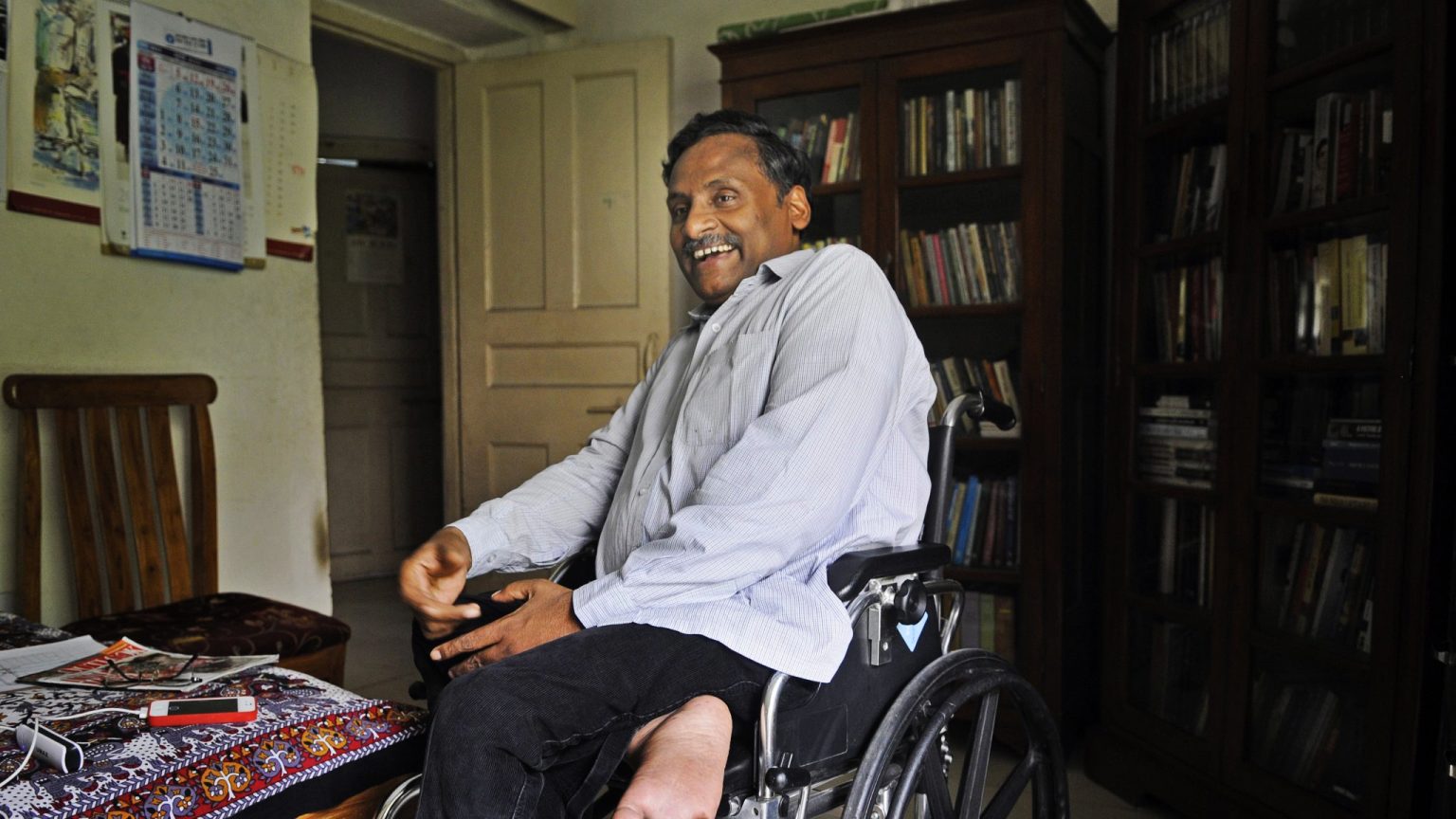Activists and organizations have expressed concern over the health of two prominent political prisoners in India, the poet Varavara Rao and professor G.N. Saibaba. On Thursday, it was revealed that 79-year-old Rao, who was shifted from prison to a hospital in Mumbai on Monday following a deterioration in his health, had tested positive for COVD-19. Saibaba, who is 90% disabled, is also in a prison where a number of cases have been reported.
Varavara Rao is an accused in the controversial Elgar Parishad case in which prominent activists and critics of the government have been charged with having links with the banned Communist Party of India (Maoist). He has been in jail since late 2018. In a press conference on Sunday, his family members spoke about the drastic deterioration in his health over the past few weeks. They said that he was hallucinating and appealed to the government to not “kill him in jail.” Rao was subsequently moved to JJ hospital in Mumbai but his family who flew in from Hyderabad was shocked to find him lying on a urine-soaked bed.
According to a letter by activist Henry Tiphagne to India’s National Human Rights Commission, “There were no attendants or nurses attending to him and only policemen standing a few meters away. Mr. Rao was lying in a pool of urine on the bed and was still incoherent. He did not recognize his wife or daughters immediately but took some time to recognize them. The family was told by the nurses that there was no equipment or treatment given in the transit ward. When his nephew tried to change his urine-soaked bed sheets, the family was thrown out by the hospital nurses.”
While in jail, Varavara Rao was assisted by a co-accused, Vernon Gonzales. “Instead of releasing VV [Varavara Rao] and saving his life at the end of March, they have put another person at risk,” said Susan Abraham, human rights lawyer and Gonzales’ wife.
Besides Rao and Gonzales, seven other activists and scholars accused in the case are lodged in the same prison, most of them aged above 60 years. They are Anand Teltumbde, Surendra Gadling, Mahesh Raut, Arun Ferreira, Gautam Navlakha, Sudhir Dhawle and Rona Wilson.
These activists are booked under the Unlawful Activities (Prevention) Act (UAPA), and are accused of plotting the assassination of Prime Minister Narendra Modi, and of having links with banned Maoist outfits – charges that have been stoutly denied by all of them. Critics say the charges against them are politically motivated as they all have an exemplary reputation of speaking up for the deprived sections of the society.
In another prison in the same State of Maharashtra, academic G.N. Saibaba continues to languish. The academic is in Nagpur prison where a number of cases have been reported. His family has appealed to the Maharashtra government to release the former professor on bail or at least grant him legal parole so that better treatment is provided to him.
“We had applied to seek parole, but the court rejected it in May. We applied again for the second time in June, but there has been no reply till now,” Saibaba’s wife, A.S. Vasantha Kumari said.
She last spoke to him on July 11 when he described the situation in the prison as well as his own condition. “Sai told me he has shooting pain and without physiotherapy his left hand is on the verge of failing… Someone in a cell nearby has tested positive for COVID-19, it’s a matter of days before it reaches him,” she added. Saibaba is suffering from a number of life-threatening ailments. According to his medical reports, he has 90 percent physical disability.
53-year-old Saibaba is also accused of having alleged links with the Maoists. After he was first arrested in May 2014, a session court in Maharashtra gave him life sentence along with four others under the Unlawful Activities Prevention Act (UAPA) in March 2018.
According to his wife, the infection is spreading rapidly inside the Nagpur Central Jail. “On July 8, all 20 prisoners of Anda cell have undergone COVID-19 swab tests and one prisoner was found infected,” Vasantha Kumari said, adding “It seems that there are maybe hundreds infected including convicts, undertrials and even the jail guards.”
The family accused the administration of negligence and denial of medical care. Several international human rights organizations have also pointed to the weak health and existing comorbidities of the Saibaba, which makes the former professor more vulnerable to the coronavirus.
Saibaba further informed his wife that some of the officials, who used to visit the jails, have also contracted the virus: “He is an easy target for the virus, and once infected, he cannot recover and survive on his own from COVID,” she stated.
“His immunity is very low and if he gets COVID-19 it is a death sentence for him,” she warned. His next bail hearing is due at the end of the month but Vasantha Kumari fears that it might be too late considering the speed at which the infection is spreading. “The judiciary could take suo moto of the urgency of the situation no?” she questioned.
Earlier in June, about 100 public intellectuals across the globe appealed to the Indian authorities and the Chief Justice of India S.A. Bobde to ensure his release, arguing that his imprisonment was based on “fabricated cases.”
(The article has inputs from Parth MN in Newsclick and Karuna John at the Indian Cultural Forum)





